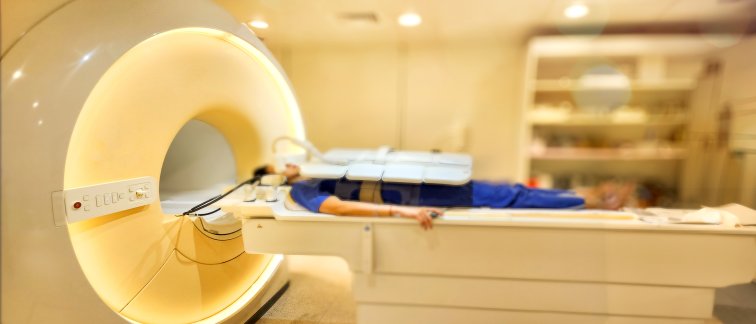Patients with metastatic gastric and esophageal cancer have a very poor prognosis. The one-year overall survival is 23%. This is partially due to the fact that systemic treatment (ie chemotherapy, targeted therapies and immunotherapy) is ineffective in a substantial part of the patients and resistance develops frequently. Patients who do not respond well to the treatment would benefit from ending or switching treatment as early as possible. Unfortunately, current treatment response cannot be determined before two months after treatment initiation.
Phosphorus (31P) MRSI detects tissue metabolism by detecting energy and phospholipid metabolites. Recent developments have enabled detection of cell metabolites in the liver. The ratio of cell membrane precursors or building blocks (phosphomonesters, PMEs) to cell membrane degradation products (phosphodiesters, PDEs) could be a biomarker for treatment response.
Within the MAESTRO study, the researchers want to find out whether changes in this PME/PDE ratio, detected using MRI spectroscopy at 7 Tesla at baseline and at two weeks after treatment initiation, are associated with treatment response, evaluated at nine weeks using standard-of-care CT scans. Here, the researchers share initial results of two responders and two non-responders to systemic treatment.
The two non-responders showed a relative increase in the PME/PDE ratio from baseline to 2 weeks after chemotherapy. That is to say, there were relatively more building blocks and/or fewer degradation products, indicating tumor growth. Whereas the two responders had a relative decrease in the PME/PDE ratio, in other words, fewer building blocks and/or more ‘rubble’.
In these four patients changes in PME/PDE ratios detected in liver metastases of gastric and esophageal cancer after only two weeks of systemic treatment when compared to baseline, were associated with standard-of-care response evaluation at nine weeks. This study shows promising results of 31P MRSI at 7T to evaluate treatment response after only 2 weeks after treatment initiation. In the future, earlier response evaluation could reduce gastric and esophageal cancer patients’ exposure to ineffective treatment, thereby reducing unnecessary side-effects and hopefully improve their quality of life.
Involved in the MAESTRO study are:
At Amsterdam UMC: Sebastiaan Siegerink, PhD student at the department of Medical Oncology, Hanneke van Laarhoven, Head of department of Medical Oncology and professor of Translational Medical Oncology; Aart Nederveen, Professor of Radiology and Nuclear Medicine; Ot Bakermans, Post-doc at the department of Radiology and Nuclear Medicine; Bobby Runderkamp, PhD candidate at the department of Radiology and Nuclear Medicine.
At UMC Utrecht: Nadia Haj Mohammed, medical oncologist; Dennis Klomp, Professor high precision structural and metabolic imaging; Mark Gosselink, MRI Researcher and RF Engineer.
At NUTRIM of Maastricht UMC+: Jeanine Prompers, Professor in Organ-Specific Metabolic Imaging.
With funding from EU-EIC-transition-MITI and a Perspectief grant from NWO TTW.

